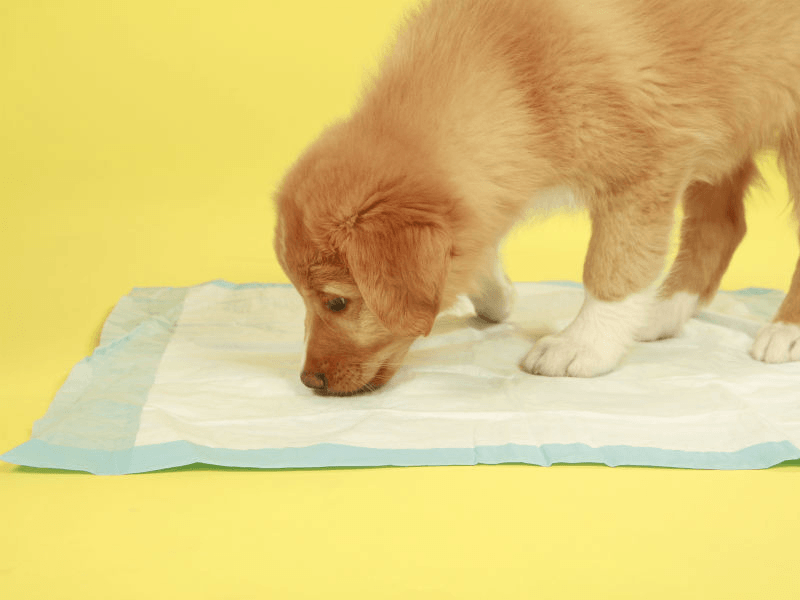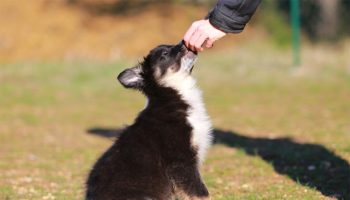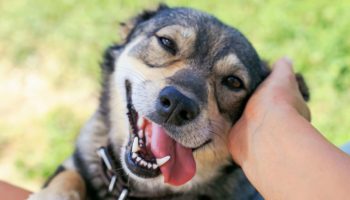It’s very unlikely that you’ll bring your puppy home and he’ll already know to go to the toilet outside, so for most, house-training is necessary.
The process can vary from dog to dog and person to person – some may find it a quick and easy process, but some may get frustrated and want to give up.
Prepare for accidents and get your anti-bac wipes at the ready, and remember – don’t give up!
When to Start House Training?
Dogs can be house trained at any time, but it’s recommended to do it when they’re puppies, as their brains are more open and adaptive to learning new things.
The optimal time for house training is any time between 12 weeks and 16 weeks old. If your dog is younger than this, he may find it more difficult to control his bladder and bowel movements, so accidents are more likely.
If your dog is 12 weeks or older and is used to going to the toilet in his cage, it may take longer to rebuild his potty habits. Puppies that are used to being around their poop and urine get used to it, so it will be a tougher task to potty train them.
Steps
There are certain steps you can take to teach your dog to go to the toilet outside. Remember, it takes patience and determination from both you and your dog.
Familiarize Yourself With Your Dog’s Routine
Get to know what your dog’s day consists of. Note when he wakes up, defecates, urinates, eats, drinks, plays, and sleeps – this is crucial to house-training.
Try to keep your dogs routine regular, and avoid changing mealtimes and bedtimes while you’re house-training your puppy.
The good news is that dogs tend to be more predictable when they’re younger, so it’s easier to understand their routines.
The bad news is that puppies notoriously have poor bladder control, so accidents are very likely as they’re younger. Fear and excitement are emotions likely to trigger an accident, so it’s important to look out for any patterns that can be avoided.
Get the Timing Right
If you notice that your puppy urinates after certain events such as the postman coming, use this to your advantage, and take your dog out just as the postman is arriving. It may take a couple of attempts to get the timing right, but potty-training is all about trial and error.
Most puppies defecate shortly after mealtimes, typically within half an hour or eating. If you notice your puppy stop playing, whining or circling, then it’s time to take him outside.
Your dog may urinate as soon as five minutes after drinking, so after your puppy has had a drink, be sure to take him out as soon as you can. Remember, younger puppies have less control of their bladder, so the quicker the better.
Be sure to take your puppy outside first thing in the morning and just before bed, as this will avoid any night-time accidents.
Stay with your dog while he’s outside, at least until he’s gone to the toilet. Take your pup to the same spot outside each time, so he gets used to the scent. Soon enough, he will go there of his own free will to go to the toilet.
Positive Reinforcement
When your dog does go potty outside, be sure to reward him with toys, treats, or affection. Saying “good boy” or “good girl” in a friendly, upbeat tone along with a treat is a great way to reward your puppy.
Be sure to repeat key words such as “wee wee” or “poop”, just like you would with a child. Your dog will soon associate these words with the actions, and the simpler the better.
Many dog owners don’t agree with negative reinforcements, such as taking away toys if your dog has an accident, or putting your pup in a crate. Positive reinforcement tends to be more effective than negative, and will strengthen your relationship with your dog.
On a Walk
It can be frustrating when you take your dog for a 40 minute walk, and he relieves himself as soon as he gets home. This is why training your dog to go to the toilet while you’re walking him is a great idea.
One of the best ways to do this is by taking your dog for a walk first thing in the morning, before he has his morning wee.
If your dog doesn’t go to the toilet on the walk, be sure to take him into your back garden as soon as you return – you don’t want any messy accidents!
Avoid These Mistakes:
● Not sticking to routine
● Over-feeding
● Feeding salty foods (makes them urinate more frequently)
● Not taking your dog out regularly
● Leaving your puppy alone for too long (he’s likely to have an accident while alone)
● Keeping your puppy locked in a crate overnight
● Leaving the back door open (your dog will no longer associate the garden as a toilet, but as an extension to the home)
Any of these mistakes can result in your dog either getting confused, or having an accident. That last thing you want is dog poop on your white carpet, but it’s not really your dog’s fault if you’ve gone to work all day and left your dog with a bowl full of food and no way to get outside.
Common sense comes into house training, so things like over-feeding and breaking routine should definitely be avoided.
Remember, patience is key when it comes to house-training. Be sure to keep to a schedule to make the process easier on your dog. It can take months to potty train even the smartest dogs, so keep at it and don’t give up.
As your dog gets older, he’ll need the freedom to go to his toilet area when he needs to go, so ensure that it’s easy to get to and not too far away from your dog’s sleeping area.
If you’re experiencing any difficulties in potty-training your puppy, then be sure to get advice from a veterinarian or a dog behavior specialist.






